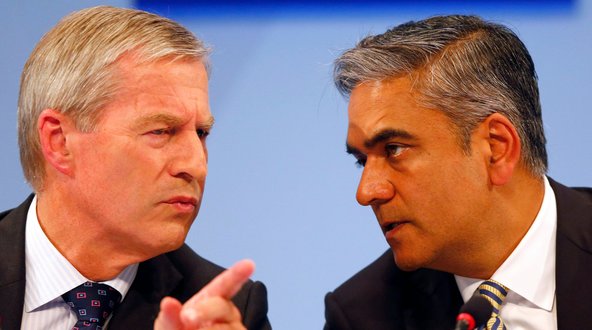 Kai Pfaffenbach/ReutersJürgen Fitschen, left, and and Anshu Jain, the co-chief executives of Deutsche Bank.
Kai Pfaffenbach/ReutersJürgen Fitschen, left, and and Anshu Jain, the co-chief executives of Deutsche Bank.
FRANKFURT – After a raid at company headquarters, Deutsche Bank disclosed Wednesday that two of its highest-ranking executives are a focus of a tax evasion investigation, dealing a fresh blow to the German institution’s already battered reputation.
German authorities are looking into whether bank employees conspired to avoid sales tax on the trading of carbon emission certificates. As part of that inquiry, prosecutors are trying to determine whether Jürgen Fitschen, the co-chief executive, and Stefan Krause, the chief financial officer, played a role by signing certain tax forms.
On Wednesday, about 500 police officers searched Deutsche Bank offices in Frankfurt, Düsseldorf and Berlin, as well as private homes. Mr. Fitschen and Mr. Krause are among 25 people who have been ensnared by the tax-evasion inquiry.
The police arrested five people, who were not identified. Those arrested did not include Mr. Fitschen or Mr. Krause.
Deutsche Bank said it was cooperating with the authorities but added that it had already revised the value-added tax reporting in question. ‘‘Unlike the Public Prosecutor’s Office, Deutsche Bank is of the opinion that this correction took place in due time,’’ the bank said in a statement. It declined to comment further.
Top executives sign many documents, and it was not clear whether prosecutors believed that Mr. Fitschen and Mr. Krause were knowingly involved in an attempt to avoid taxes. Prosecutors could not be reached for comment late Wednesday.
The investigation will only complicate the bank’s turnaround efforts.
Like rivals, the German institutions is struggling in the face of the European debt crisis, weak economic conditions and new regulation. Deutsche Bank could be hit particularly hard by new rules taking effect in the coming years that will require banks to increase the amount of capital they hold as a cushion against losses. Deutsche Bank has acknowledged that it needs to bolster its reserves.
At the same time, Mr. Fitschen and Anshu Jain, the bank’s other co-chief executive, have been trying improve the bank’s image. In September, Mr. Fitschen and Mr. Jain announced a broad effort to raise ethical standards. Acknowledging that the bank had made mistakes, the executives promised to reduce risk, set more modest profit goals and reduce employee bonuses.
But those efforts have been stymied by a series of setbacks.
The bank is among institutions being investigated by the authorities in the United States and Europe in connection with possible manipulation of the London interbank offered rate, or Libor, which is used to set rates for trillions of dollars in mortgages and other financial instruments worldwide.
In May, Deutsche Bank paid $202 million to settle claims by the U.S. Department of Justice that one of the bank’s subsidiaries had filed false information in order to qualify for federal mortgage insurance. The bank is also the target of multiple lawsuits in the United States related to its sale of securities linked to the mortgage market.
While bank executives appeared to be surprised by the raid Wednesday, the underlying allegations had been known for several years.
Since 2005, the European Union has set allowances for energy producers, manufacturers and other companies that produce carbon dioxide and other gases that contribute to global warming. Companies that do not use all their allowances may sell them, a system designed to give the companies an incentive to reduce their emissions.
The European Commission has repeatedly made changes to the system that are intended to prevent abuses. In the past, traders have collected value-added tax from customers but failed to pass the money on to governments.
In October, the Süddeutsche Zeitung, a newspaper in Munich, reported that Deutsche Bank fired five traders in connection with irregularities in carbon trading. The bank has not denied the report..
Article source: http://dealbook.nytimes.com/2012/12/12/top-deutsche-bank-executives-ensnared-by-tax-evasion-inquiry/?partner=rss&emc=rss